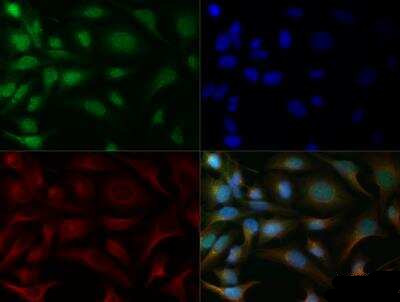Noxa (PMAIP1) Rabbit Polyclonal Antibody
Frequently bought together (3)
Recombinant protein of human phorbol-12-myristate-13-acetate-induced protein 1 (PMAIP1)
USD 823.00
Transient overexpression lysate of phorbol-12-myristate-13-acetate-induced protein 1 (PMAIP1)
USD 396.00
Other products for "Noxa"
Specifications
| Product Data | |
| Applications | WB |
| Recommended Dilution | Immunocytochemistry/ Immunofluorescence: 1:200, Immunohistochemistry: 1:50 - 1:250, Immunohistochemistry-Paraffin: 1:50 - 1:250, Western Blot: 1 - 2 ug/mL |
| Reactivities | Human, Mouse, Rat |
| Host | Rabbit |
| Clonality | Polyclonal |
| Immunogen | This antibody was developed by immunizing rabbits with a mixture of synthetic peptides containing amino acids 51-66 and 75-90 of mouse Noxa. |
| Formulation | PBS containing 0.05% BSA, 0.05% Sodium Azide. Store at 4C short term. Aliquot and store at -20C long term. Avoid freeze-thaw cycles. |
| Concentration | lot specific |
| Purification | Protein G purified |
| Conjugation | Unconjugated |
| Storage | Store at -20°C as received. |
| Stability | Stable for 12 months from date of receipt. |
| Gene Name | phorbol-12-myristate-13-acetate-induced protein 1 |
| Database Link | |
| Background | Recently, a BH-3 only member of the Bcl-2 family have been identified in human and mouse and designated as Noxa (for damage) (1). The expression of the Noxa gene involves direct activation of its promoter by p53. Increased expression of Noxa protein occurs in normal thymocytes but not in p53-deficient thymocytes. Noxa cDNA codes for a 103-amino acid protein. The coimmunoprecipitation data suggest that Noxa protein may interact with proteins belonging to the Bcl-2 family, such as, Bcl-XL and Mcl-1. Oda et al (1) have also shown that blocking the endogenous Noxa induction results in the suppression of apoptosis. Treatment of cells with Noxa antisense oligonucleotides blocks radiation-induced apoptosis suggesting that Noxa may represent a mediator of p53-dependent apoptosis. |
| Synonyms | APR; NOXA |
| Note | Immunohistochemistry-Paraffin: see Inta et al. (2006) for details |
| Reference Data | |
| Protein Families | Druggable Genome, Stem cell - Pluripotency |
| Protein Pathways | p53 signaling pathway |
Documents
| Product Manuals |
| FAQs |
| SDS |
{0} Product Review(s)
0 Product Review(s)
Submit review
Be the first one to submit a review
Product Citations
*Delivery time may vary from web posted schedule. Occasional delays may occur due to unforeseen
complexities in the preparation of your product. International customers may expect an additional 1-2 weeks
in shipping.






























































































































































































































































 Germany
Germany
 Japan
Japan
 United Kingdom
United Kingdom
 China
China




